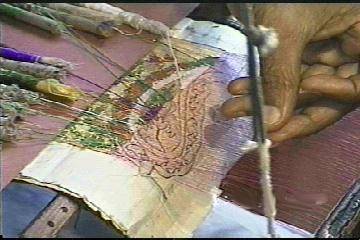India - Special weaves
Dhurries & Dhurries of Hyderabad, Andra Pradesh, also known as Safrani Exports, is a business owned by Suraiya Hasan. It features handcrafted textiles of the best quality and styles to suit the modern lifestyle. In addition to serving the local clientele, it also has a wide range of products exported around the world. Their ikats and kalamkaris, vegetable dyed cottons are crafted by skilled artisans in remote villages. There is yardage and also garments such as shirts and dressing gowns. Suraiya has a love and respect for the Indian textile tradition, and is putting a great effort into preserving the more endangered skills that are being lost . Combined with their business of marketing there is a training program using master weavers to pass along skills to young women needing opportunities. They have built a complete school on there land behind the business and the women's children can go there free of charge. |
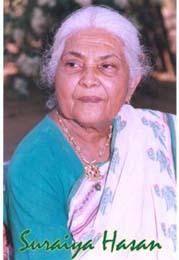 |
Gold Paithan
weaving is extremely slow |
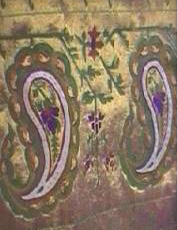 |
This
young woman is learning the gold tapestry weaving called Paithan.
The work uses small bobbins for each colour. The warp is silk, weft
silks and gold thread made by pounding real gold extremely finely
and then wrapping around a silk core. This narrow piece will be sewn
to the edge of a sari. Wider borders are often woven to compliment
the pallav, the decorative end of the sari. These saris are treasured
and handed down in families through generations. |
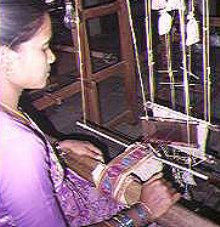 |
Syed Omar, master weaver, is designing on the frame used to develop new concepts in the revival of Himroo, a technique originally developed in Aurangabad 400 years ago during the Deccan Empire. The resulting fabric of cotton or silk is suitable for upholstery, jackets, or anything requiring an elegant fabric. This fabric is woven on a version of a drawloom.
|
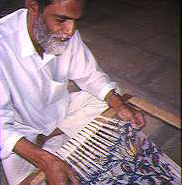 |
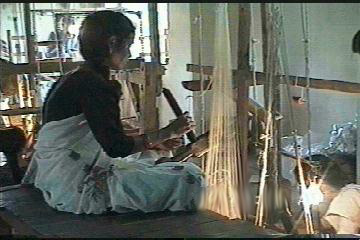 |
The drawloom requires an assistant to the weaver sitting at the top of the loom helping to select the"pick" for each successive row of weft. These "picks"have been preselected and tied in groups for easy access. This ancient technology is the precursor to the computer loom. |

